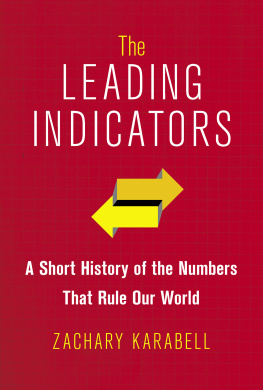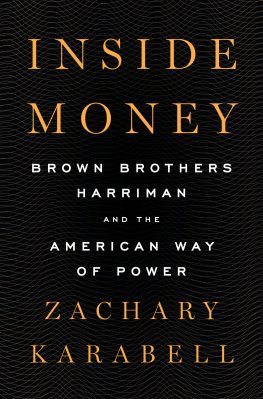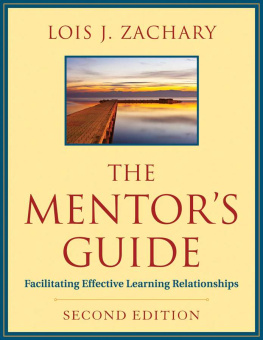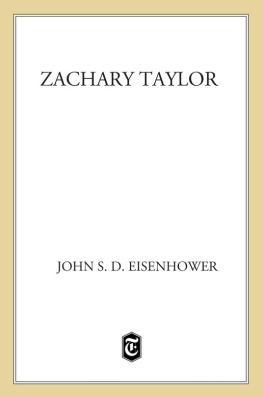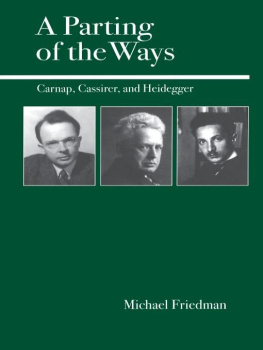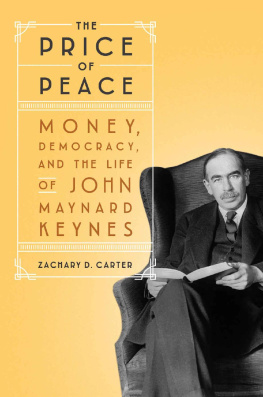Zachary Karabell - Parting the Desert
Here you can read online Zachary Karabell - Parting the Desert full text of the book (entire story) in english for free. Download pdf and epub, get meaning, cover and reviews about this ebook. year: 2003, publisher: Knopf Doubleday Publishing Group, genre: History. Description of the work, (preface) as well as reviews are available. Best literature library LitArk.com created for fans of good reading and offers a wide selection of genres:
Romance novel
Science fiction
Adventure
Detective
Science
History
Home and family
Prose
Art
Politics
Computer
Non-fiction
Religion
Business
Children
Humor
Choose a favorite category and find really read worthwhile books. Enjoy immersion in the world of imagination, feel the emotions of the characters or learn something new for yourself, make an fascinating discovery.

- Book:Parting the Desert
- Author:
- Publisher:Knopf Doubleday Publishing Group
- Genre:
- Year:2003
- Rating:4 / 5
- Favourites:Add to favourites
- Your mark:
- 80
- 1
- 2
- 3
- 4
- 5
Parting the Desert: summary, description and annotation
We offer to read an annotation, description, summary or preface (depends on what the author of the book "Parting the Desert" wrote himself). If you haven't found the necessary information about the book — write in the comments, we will try to find it.
Parting the Desert — read online for free the complete book (whole text) full work
Below is the text of the book, divided by pages. System saving the place of the last page read, allows you to conveniently read the book "Parting the Desert" online for free, without having to search again every time where you left off. Put a bookmark, and you can go to the page where you finished reading at any time.
Font size:
Interval:
Bookmark:
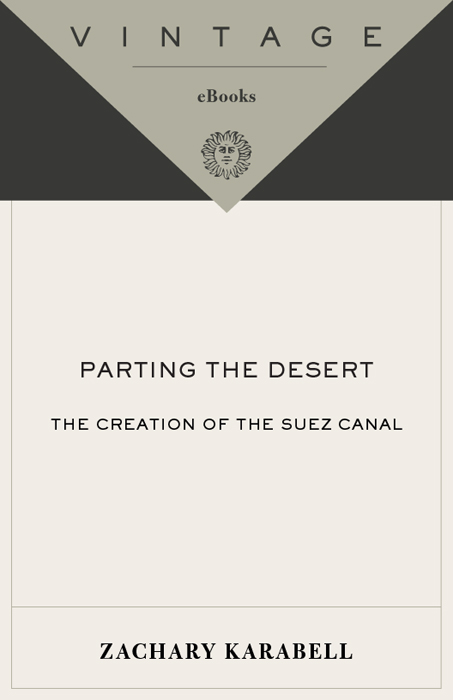
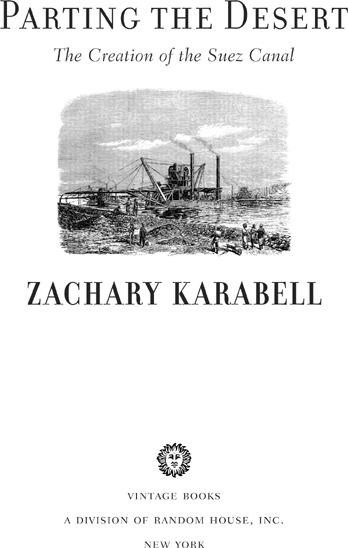
ACCLAIM FOR ZACHARY KARABELLS
P ARTING THE D ESERT
A fascinating saga: of diplomacy involving primarily the French and the Egyptians, of raising gigantic sums of money, of overcoming massive geographical and technological obstacles long before the invention of mechanized earth-moving equipment. The business aspects sometimes seem as if they are ripped from last months headlines.
Milwaukee Journal Sentinel
A rich and engaging narrative of one of the greatest engineering feats of the nineteenth century [with] resonance beyond its time.
Alexander Stille, author of The Future of the Past
An absorbing, well-written narrative. [Karabell gives] dimension to the personalities, eccentricities and strengths of key figures. [A] fascinating account.
San Antonio Express-News
Karabell tells his story elegantly distilling a large cast spread across several countries into a manageable one. Karabell seldom wastes a sentence as he offers one well-chosen anecdote after another that sheds light on the greater drama of this important and historic construction project.
Charleston Gazette
A fascinating, epic, elegiac story. Zachary Karabells account of the political intrigue, quixotic dreamers, and engineering genius that led to the construction of the Suez Canal vividly brings to life one of the underappreciated marvels of the modern world. The book is a triumph of history and art.
Bruce Feiler, author of Abraham: A Journey to the Heart of Three Faiths
A tale shot through with unexpected twists. Karabell tells his story concisely and with narrative skill, peppering the account with many wry anecdotes.
The Jerusalem Post
Engrossing. As accessible and vividly written as a novel it maintains a page-turning pace. Superbly researched, it is a volume to keep.
The Sunday Times (London)
Zachary Karabell has written an absorbing narrative [He] traces with skill the complex diplomatic and engineering feat [and] prompts reflections about the futility of human effort and the evanescence of glory.
The Times Literary Supplement (London)
A riveting story, and Karabell tells it handsomely. An exceptional book, one of the best of its kind I have read.
George Rosie, Sunday Herald
Well-researched and very well-written. The tens of thousands of the Egyptian fellahin peasantry who dug the canal did indeed part the desert, and their story cannot have been better told than by this fine book.
The Sunday Telegraph (London)
Fascinating elegiac. Parting the Desert is an excellent story, skillfully told. Even those who are bored to tears by canals, whose eyes glaze over at the first mention of engineering, will find themselves, as this reader did, racing through it.
Justin Marozzi, Literary Review
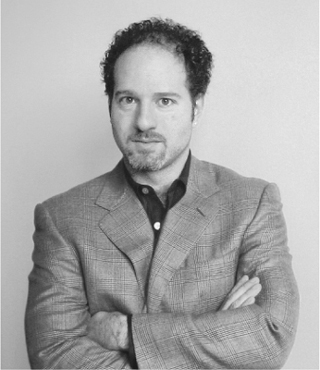
ZACHARY KARABELL
P ARTING THE D ESERT
Zachary Karabell was educated at Columbia; Oxford, where he received a degree in Modern Middle Eastern Studies; and Harvard, where he received his Ph.D. in 1996. He has taught at Harvard, the University of Massachusetts at Boston, and Dartmouth. He is the author of several books, including The Last Campaign: How Harry Truman Won the 1948 Election, which won the Chicago Tribune Heartland prize. His essays and reviews have appeared in various publications, such as The New York Times, the Los Angeles Times, Foreign Policy, and Newsweek. Karabell lives in New York City.
ALSO BY ZACHARY KARABELL
Whats College For?
The Struggle to Define American Higher Education
Architects of Invention: The United States, the Third World,
and the Cold War, 1946-1962
The Last Campaign:
How Harry Truman Won the 1948 Election
A Visionary Nation:
Four Centuries of American Dreams and What Lies Ahead
Chester Alan Arthur
Chapter 1:
Chapter 2:
Chapter 3:
Chapter 4:
Chapter 5:
Chapter 6:
Chapter 7:
Chapter 8:
Chapter 9:
Chapter 10:
Chapter 11:
Chapter 12:
Chapter 13:
Chapter 14:
Chapter 15:
Chapter 16:
Chapter 17:
Chapter 18:
Chapter 19:
Chapter 20:
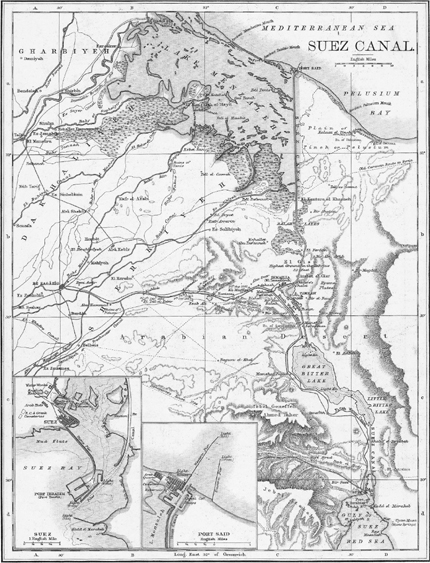
T HE T WILIGHT
I T WAS LATE afternoon in the desert when they emerged from the labyrinth of eddies that flowed through the Nile Delta. The breeze carried the trace of salt from the Mediterranean, and though the wind was less harsh than it had been several weeks before, the area was still desolate. The day had been warm; the night promised bitter cold, but at least they had finally arrived at their destination on the coast, where the easternmost branch of the Nile used to meet the Mediterranean Sea. Pitching their tents, Ferdinand de Lesseps and his companions settled in for the evening.
They had sailed from Damietta, where St. Louis had landed centuries before in a fools errand of a crusade, and where much later Napoleons troops stumbled on the Rosetta Stone. They had crossed Lake Manzala, in four fishing boats outfitted with small cabins to shelter them at night. And then they camped on the thin littoral separating the brackish lake from the waters of the Mediterranean. They were not there to explore. They were there to begin.
At dawn on April 25, 1859, they packed their camels and hurried to their destination, where they were joined by a group of Egyptian laborers. There were 150 altogether, diplomats, businessmen, engineers, and peasants. Their silhouettes moved across the sunrise, and over each shoulder there was a pickax.
At a spot known only to him, Lesseps raised his hand and ordered the company to halt. They unloaded their gear and stood, picks in hand, waiting. Lesseps looked toward the sea and then back toward the desert. His compact energy conveyed a surprising vigor for a fifty-three-year-old widowed former bureaucrat. His eyes set, his mustache elegantly trimmed, he was at a pivotal point in his life, and he knew it.
It was an act of theater, carefully staged. No official representatives of any government attended the ceremony, and the story of what happened was disseminated only by Lesseps himself. He unfurled an Egyptian flag and planted it in the ground, yet there was something furtive about the whole endeavor. He had sought but not formally received the blessing of the ruler of Egypt. He decided to proceed anyway. He paused for a moment, not just because he was taking a risk, but because he was about to change the political landscape of three continents, because he was embarking on an adventure that would alter the terrain of the planet. Then he spoke.
In the name of the Universal Company of the Maritime Suez Canal, we are about to commence this work, which will open up the East to the commerce and civilization of the West. The thorough surveys that we have done give us the confidence that the enterprise that commences today will not only be a work of progress, but will return immense rewards to those who have striven to make it real. He told the group to lift up their axes. Remember, he continued, you are not simply digging up soil. Your work will bring prosperity to your families and to your countries. Then he asked one of the workers to hand him an ax. Shouting, In honor of the viceroy Muhammad Said Pasha, he raised his arm, and 150 arms raised up with him. Row after row of metal picks gleamed in the sun and descended into the earth. The building of the Suez Canal had begun.
Font size:
Interval:
Bookmark:
Similar books «Parting the Desert»
Look at similar books to Parting the Desert. We have selected literature similar in name and meaning in the hope of providing readers with more options to find new, interesting, not yet read works.
Discussion, reviews of the book Parting the Desert and just readers' own opinions. Leave your comments, write what you think about the work, its meaning or the main characters. Specify what exactly you liked and what you didn't like, and why you think so.

